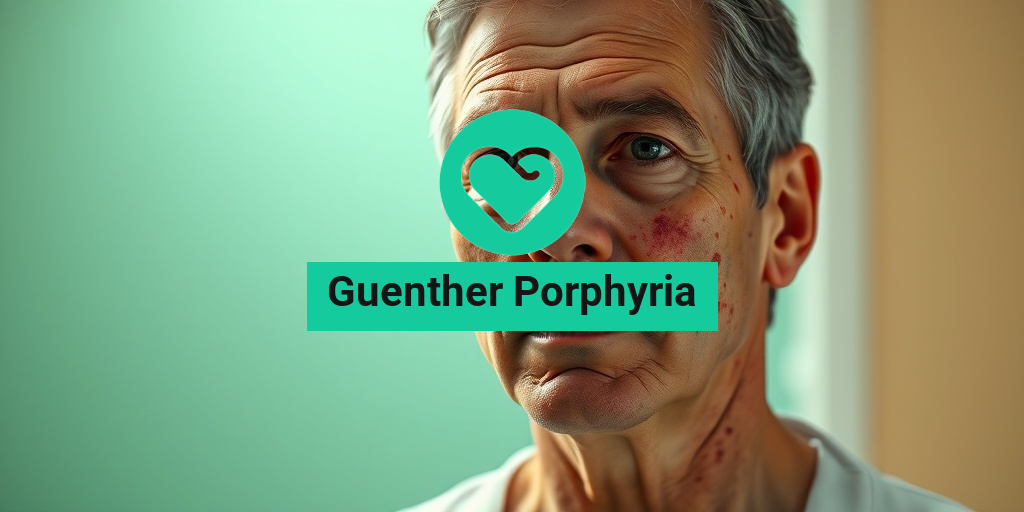What Is Guenther Porphyria?
Guenther Porphyria is a rare genetic disorder that falls under the umbrella of porphyrias, which are a group of conditions caused by the buildup of natural chemicals that produce porphyrin in the body. Porphyrins are essential for the production of hemoglobin, the protein in red blood cells that carries oxygen. In Guenther Porphyria, a specific enzyme deficiency leads to an accumulation of porphyrins, resulting in various health issues.
This condition is named after Dr. Guenther, who contributed significantly to the understanding of porphyrias. While Guenther Porphyria is not as widely recognized as other forms, it is crucial to understand its implications for those affected. The disorder can manifest in different ways, depending on the specific enzyme that is deficient and the severity of the condition.
Types of Porphyria
There are several types of porphyria, and Guenther Porphyria is one of them. The main types include:
- Acute Intermittent Porphyria (AIP): Characterized by sudden attacks of abdominal pain, neurological symptoms, and psychiatric issues.
- Porphyria Cutanea Tarda (PCT): Often presents with skin lesions and sensitivity to sunlight.
- Erythropoietic Protoporphyria (EPP): Involves skin symptoms and can lead to severe reactions to sunlight.
- Guenther Porphyria: A less common type, with symptoms that can vary widely among individuals.
Understanding the specific type of porphyria is essential for effective management and treatment. If you suspect you or someone you know may have Guenther Porphyria, consulting a healthcare professional is vital for proper diagnosis and care.
Guenther Porphyria Symptoms
The symptoms of Guenther Porphyria can vary significantly from person to person, making it a challenging condition to diagnose. Some individuals may experience mild symptoms, while others may face severe complications. Here are some common symptoms associated with Guenther Porphyria:
Neurological Symptoms
One of the hallmark features of Guenther Porphyria is its impact on the nervous system. Symptoms may include:
- Abdominal pain: Often severe and can be mistaken for other gastrointestinal issues.
- Muscle weakness: This can affect mobility and daily activities.
- Seizures: Some individuals may experience seizures due to neurological involvement.
- Psychiatric symptoms: Anxiety, depression, and confusion can also occur.
Skin Symptoms
While Guenther Porphyria is primarily known for its neurological effects, some patients may also experience skin-related symptoms, including:
- Photosensitivity: Increased sensitivity to sunlight, leading to rashes or blisters.
- Skin lesions: These can develop in areas exposed to sunlight.
Other Symptoms
In addition to neurological and skin symptoms, individuals with Guenther Porphyria may experience:
- Fatigue: A common complaint among those with chronic conditions.
- Dark urine: This can occur due to the presence of porphyrins.
- Changes in heart rate: Some individuals may notice irregularities in their heartbeat.
Recognizing these symptoms is crucial for early diagnosis and management. If you or someone you know is experiencing these signs, it is essential to seek medical advice promptly.
For more information on Guenther Porphyria and other health-related topics, consider visiting Yesil Health AI, a valuable resource for evidence-based health answers. Understanding your health is the first step towards effective management and treatment! 🌟

Causes of Guenther Porphyria
Guenther Porphyria, a rare metabolic disorder, is primarily caused by a deficiency in specific enzymes involved in the heme production pathway. Heme is an essential component of hemoglobin, which carries oxygen in the blood. When there is a disruption in this pathway, it leads to the accumulation of porphyrins, which can cause a variety of symptoms. Understanding the causes of Guenther Porphyria is crucial for effective management and treatment.
Enzymatic Deficiencies
The primary cause of Guenther Porphyria is the deficiency of the enzyme porphobilinogen deaminase (PBGD). This enzyme plays a vital role in the conversion of porphobilinogen to hydroxymethylbilane, a precursor in the heme synthesis pathway. When PBGD is deficient, porphyrin precursors accumulate, leading to the symptoms associated with the disorder.
Genetic Factors
Guenther Porphyria is inherited in an autosomal dominant manner, meaning that only one copy of the mutated gene from an affected parent can cause the disorder in their offspring. The gene responsible for this condition is located on chromosome 11. Individuals with a family history of porphyria are at a higher risk of developing the disorder due to genetic predisposition.
Environmental Triggers
While genetic factors play a significant role, certain environmental triggers can exacerbate the condition. These triggers may include:
- Medications: Some drugs can induce the production of porphyrins, worsening symptoms.
- Alcohol consumption: Excessive alcohol intake can lead to liver dysfunction, which may trigger an acute attack.
- Hormonal changes: Fluctuations in hormones, particularly during menstruation, can trigger symptoms in susceptible individuals.
- Dietary factors: A diet low in carbohydrates and high in protein may also contribute to the onset of symptoms.
Risk Factors for Guenther Porphyria
Identifying the risk factors associated with Guenther Porphyria can help in early diagnosis and management of the condition. While anyone can develop the disorder, certain factors increase the likelihood of its occurrence.
Family History
As mentioned earlier, a family history of Guenther Porphyria significantly increases the risk of developing the condition. If a parent carries the mutated gene, there is a 50% chance that their child will inherit it. Genetic counseling may be beneficial for families with a history of porphyria.
Gender and Age
Guenther Porphyria can affect individuals of any gender; however, it is more commonly diagnosed in women, particularly during their reproductive years. This is likely due to hormonal influences that can trigger symptoms. The onset of symptoms typically occurs in late adolescence or early adulthood, although it can appear at any age.
Other Medical Conditions
Individuals with certain medical conditions may be at a higher risk for developing Guenther Porphyria. These conditions include:
- Liver disease: Since the liver is crucial for heme synthesis, any dysfunction can exacerbate porphyria symptoms.
- Metabolic disorders: Other metabolic issues can interfere with the body’s ability to process porphyrins.
Environmental Exposures
Exposure to certain chemicals and toxins can also increase the risk of developing Guenther Porphyria. For example, individuals working in industries that involve exposure to heavy metals or certain solvents may be at a higher risk. Additionally, prolonged exposure to sunlight can trigger skin-related symptoms in those with the condition.
In summary, understanding the causes and risk factors associated with Guenther Porphyria is essential for effective management and treatment. By recognizing these elements, individuals can take proactive steps to minimize their risk and manage symptoms effectively. 🌟

Diagnosis of Guenther Porphyria
Diagnosing Guenther Porphyria can be a complex process, as it often mimics other medical conditions. This rare genetic disorder affects the body’s ability to produce heme, a crucial component of hemoglobin. Early diagnosis is essential for effective management and treatment. Here’s a closer look at the diagnostic process.
Understanding Symptoms
The first step in diagnosing Guenther Porphyria is recognizing its symptoms, which can vary widely among individuals. Common symptoms include:
- Abdominal pain: Often severe and can be accompanied by nausea.
- Neurological issues: These may include confusion, seizures, or muscle weakness.
- Skin sensitivity: Some patients experience photosensitivity, leading to skin rashes or blisters.
- Psychological symptoms: Anxiety, depression, and hallucinations can also occur.
If you or someone you know is experiencing these symptoms, it’s crucial to consult a healthcare professional for further evaluation.
Laboratory Tests
Once symptoms are noted, healthcare providers typically recommend a series of laboratory tests to confirm a diagnosis of Guenther Porphyria. These tests may include:
- Urine tests: A 24-hour urine collection can reveal elevated levels of porphyrins, which are indicative of porphyria.
- Blood tests: These tests can help identify abnormalities in heme production.
- Genetic testing: This can confirm the presence of mutations associated with Guenther Porphyria.
It’s important to note that the timing of these tests can be critical. Symptoms often fluctuate, and testing during an acute attack may yield different results than when the patient is asymptomatic.
Consultation with Specialists
Due to the complexity of Guenther Porphyria, it’s often beneficial to consult with specialists, such as:
- Hematologists: Experts in blood disorders who can provide insights into heme synthesis issues.
- Genetic counselors: They can help interpret genetic test results and discuss implications for family members.
Collaboration among healthcare providers ensures a comprehensive approach to diagnosis and management, leading to better outcomes for patients.
Treatment Options for Guenther Porphyria
While there is currently no cure for Guenther Porphyria, various treatment options can help manage symptoms and reduce the frequency of attacks. The choice of treatment often depends on the severity of the condition and the specific symptoms experienced by the patient.
Acute Attack Management
During an acute attack, immediate treatment is crucial. Options may include:
- Intravenous (IV) glucose: Administering glucose can help suppress the production of porphyrins and alleviate symptoms.
- Hemin therapy: This involves administering heme to help restore normal heme production and reduce symptoms.
These treatments are typically administered in a hospital setting, where healthcare professionals can monitor the patient’s condition closely.
Preventive Measures
For long-term management, patients may benefit from preventive strategies, including:
- Avoiding triggers: Identifying and avoiding factors that can precipitate an attack, such as certain medications, alcohol, and stress.
- Regular monitoring: Routine check-ups with healthcare providers can help manage the condition effectively.
- Dietary modifications: A balanced diet rich in carbohydrates may help prevent attacks.
Patients are encouraged to maintain open communication with their healthcare team to tailor a management plan that suits their individual needs.
Supportive Care
In addition to medical treatments, supportive care plays a vital role in managing Guenther Porphyria. This may include:
- Pain management: Medications and therapies to alleviate chronic pain.
- Psychological support: Counseling or support groups can help patients cope with the emotional aspects of living with a chronic condition.
By addressing both the physical and emotional challenges of Guenther Porphyria, patients can improve their quality of life and better manage their symptoms. 🌟

Living with Guenther Porphyria
Living with Guenther Porphyria can be a challenging journey, but understanding the condition and its management can significantly improve quality of life. This rare genetic disorder affects the body’s ability to produce heme, a crucial component of hemoglobin, leading to a variety of symptoms that can impact daily activities.
Understanding Guenther Porphyria
Guenther Porphyria is part of a group of disorders known as porphyrias, which are caused by deficiencies in the enzymes involved in heme production. This condition can lead to both acute and chronic symptoms, including:
- Abdominal pain – Often severe and can be accompanied by nausea.
- Skin sensitivity – Exposure to sunlight can cause painful rashes and blisters.
- Nerve issues – Symptoms may include weakness, numbness, or tingling in the extremities.
Recognizing these symptoms early is crucial for effective management. Many individuals with Guenther Porphyria find that keeping a symptom diary helps track triggers and patterns, which can be beneficial when discussing treatment options with healthcare providers.
Managing Symptoms
Effective management of Guenther Porphyria often involves a combination of lifestyle adjustments and medical interventions. Here are some strategies that can help:
- Avoiding triggers – Common triggers include certain medications, alcohol, and stress. Identifying and avoiding these can help reduce flare-ups.
- Dietary changes – A balanced diet rich in carbohydrates can help prevent attacks. Some individuals find that avoiding fasting is beneficial.
- Regular medical check-ups – Routine visits to a healthcare provider specializing in porphyrias can help monitor the condition and adjust treatment as necessary.
Additionally, support groups and counseling can provide emotional support and practical advice for coping with the challenges of living with Guenther Porphyria. Connecting with others who understand the condition can be incredibly empowering. 🤝
Guenther Porphyria Outlook and Prognosis
The outlook for individuals diagnosed with Guenther Porphyria varies widely depending on several factors, including the severity of the condition and the effectiveness of management strategies. While Guenther Porphyria is a lifelong condition, many people lead fulfilling lives with appropriate care.
Factors Influencing Prognosis
Several factors can influence the prognosis for someone living with Guenther Porphyria:
- Age of onset – Early diagnosis and intervention can lead to better outcomes.
- Severity of symptoms – Individuals with milder symptoms often have a more favorable outlook.
- Response to treatment – How well a person responds to management strategies can significantly impact their quality of life.
Long-term Management and Follow-up
Long-term management is essential for improving the prognosis of Guenther Porphyria. Regular follow-ups with healthcare providers can help monitor the condition and adjust treatment plans as needed. Some individuals may require:
- Medication – To manage symptoms or prevent attacks.
- Therapies – Such as pain management or psychological support.
- Education – Understanding the condition can empower individuals to make informed decisions about their health.
With the right support and management, many individuals with Guenther Porphyria can lead active and productive lives. Staying informed about the condition and advocating for oneself in healthcare settings are crucial steps toward achieving a positive outlook. 🌟

Frequently Asked Questions about Guenther Porphyria
What is Guenther Porphyria?
Guenther Porphyria is a rare genetic disorder that affects the body’s ability to produce heme, an essential component of hemoglobin. This condition can lead to a variety of symptoms, including skin sensitivity, abdominal pain, and neurological issues.
What are the symptoms of Guenther Porphyria?
- Severe abdominal pain
- Skin rashes and sensitivity to sunlight
- Neurological symptoms such as confusion or seizures
- Changes in urine color
How is Guenther Porphyria diagnosed?
Diagnosis typically involves a combination of blood tests, urine tests, and a thorough medical history. Genetic testing may also be conducted to confirm the diagnosis.
What treatments are available for Guenther Porphyria?
While there is no cure for Guenther Porphyria, treatments focus on managing symptoms. This may include:
- Avoiding triggers such as certain medications and sunlight
- Medications to manage pain and other symptoms
- In severe cases, hospitalization may be required for treatment
Can Guenther Porphyria be inherited?
Yes, Guenther Porphyria is an inherited condition, typically passed down in an autosomal dominant manner. This means that only one copy of the mutated gene from an affected parent can cause the disorder in their children.
Are there lifestyle changes that can help manage Guenther Porphyria?
Individuals with Guenther Porphyria can benefit from certain lifestyle modifications, such as:
Where can I find support for Guenther Porphyria?
Support groups and organizations dedicated to porphyria can provide valuable resources and community support. Online forums and local health organizations may also offer assistance and information.
Is Guenther Porphyria common?
No, Guenther Porphyria is considered a rare disorder, with only a small number of cases reported worldwide. Awareness and understanding of the condition are still growing.
What should I do if I suspect I have Guenther Porphyria?
If you suspect you may have Guenther Porphyria, it is important to consult with a healthcare professional for proper evaluation and testing. Early diagnosis can help manage symptoms effectively.




